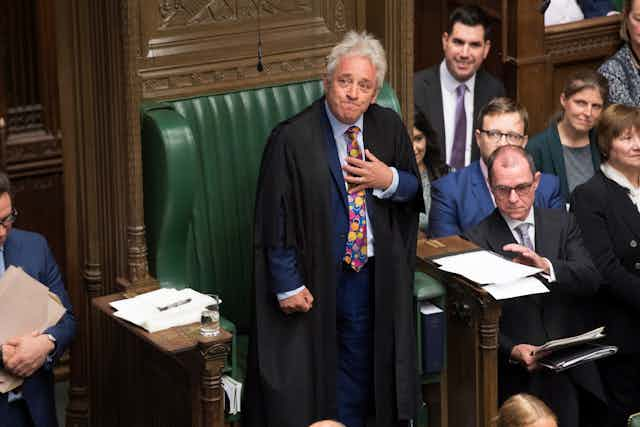Pig-headed, obnoxious, pompous, too fond of the sound of his own voice … John Bercow has collected a range of epithets during his period as speaker of the House of Commons. And yet my sense is that even his harshest critics harbour at least some grudging respect for him as the speaker who really did speak for parliament.
The events that unfolded in the hours after Bercow’s announcement that he is to stand down, and before parliament was prorogued for five weeks, underline this. As MPs claimed they were being “silenced” in the run up to Brexit, we were reminded just why we need individuals with the capacity to push back against executive over-stepping.
Indeed, Bercow’s biggest achievement was his role in reclaiming constitutional territory from an incredibly powerful executive. Although the parliamentary decline thesis was always overstated, there is little doubt that the balance in the legislative-executive relationship had swayed too far in favour of the latter.
As Bercow outlined in his resignation speech, he adopted the role of “the backbenchers backstop” and sought to facilitate at least a partial rebalance of power between the House of Commons and government. Take, for example, the huge growth in urgent questions to ministers that he took no little pleasure in approving. This – if we are honest – explains a lot of the resentment and opprobrium he has attracted. A strong speaker is never going to win friends.

If winning friends was never going to be John Bercow’s main priority, then speaking for parliament, both within and beyond the Palace of Westminster, was. The simple fact is that the constitution provides for the existence of very few ambassadors for the institution of parliament.
MPs speak for their party and constituents, ministers speak for the government, parliamentary staff are generally expected not to speak at all … so who speaks to explain and defend the role of parliament? The answer in recent years has been John Bercow. This helps explain just why the role of speaker has changed almost beyond recognition.
Redefining the job and reforming the house
In order to understand this transformation, it is necessary to look back to the genesis of Bercow’s tenure. His was a term of office born in a parliamentary scandal that shook the very foundations of British democracy and brought parliament to its knees.
To some extent, the MPs expenses scandal continues to cast a shadow over British politics but it was Bercow who, at the time, recognised the need for a far-reaching reform agenda. Elected largely thanks to the support of opposition MPs and in a context defined by crisis, the die was cast for a speakership that was never going to sail across calm seas – especially in an institution where reform and modernisation generally happen at a glacial pace.
In good, traditional, step-by-step, chip-by-chip pragmatic parliamentary tradition, Bercow set about shifting the balance of power internally and speaking up for parliament externally. It is this latter element that has generally gone unnoticed.
Not only has Bercow invested huge amounts of time and energy in travelling up and down the UK to engage with young people about why parliament matters, but he has also opened up the speaker’s apartments in Westminster to facilitate visits and charitable events like none of his predecessors. A huge amount of positive work to diversify the profile of parliamentary staff has also been undertaken, largely without recognition.
There have, of course, been stumbles and errors along the way and my sense is that Bercow would be the first to recognise this. With the benefit of hindsight, his early attempt to modernise the internal governance of the House of Commons was probably too much, too soon. But then again, the curse of the moderniser, especially in a parliamentary context, is that you’re dammed if you do and dammed if you don’t. Overall, however, it is Bercow’s determination to speak for parliament in the face of an increasingly aggressive government and a critical public that is likely to ensure that historians are far kinder in assessing his tenure than recent commentators have generally been.
Leaving the hot seat
It’s no secret that debates concerning when Bercow would step down have been ongoing for some time. His decision to leave now, at this moment, is connected to his views on balancing the relationship between executive and legislature.
Put simply, Bercow wants the current parliament to choose his successor. The danger of an effective speaker who seeks – as Bercow has – to extend and defend the territory of parliament at the cost of the executive is that a future government will do all it can to ensure that the next incumbent is less troublesome. It’s pure and simple power politics. By ensuring his successor is selected by the current parliament, Bercow is seeking to reduce the chances of a patsy appointment.
The list of candidates to replace Bercow is likely to be long and, unless constitutional conventions are torn-up once again, it will be a Labour backbencher, hopefully a woman and someone who commands respect on all sides of the House.
The tears that were obvious in the speaker’s eyes as he announced his decision to step down were more likely of relief than of sadness or anger or disappointment. What I realised, as Bercow looked up to the gallery to acknowledge the love and support of his wife and children, is just how much of a toll a career in politics takes on individuals.
Politics is a brutal game and the hot seat of the speaker’s chair has, in recent years, become one of the most demanding and pressurised positions to fill. But, when all is said and done, he’ll be remembered as a successful speaker who really did redefine the role and speak for parliament.

